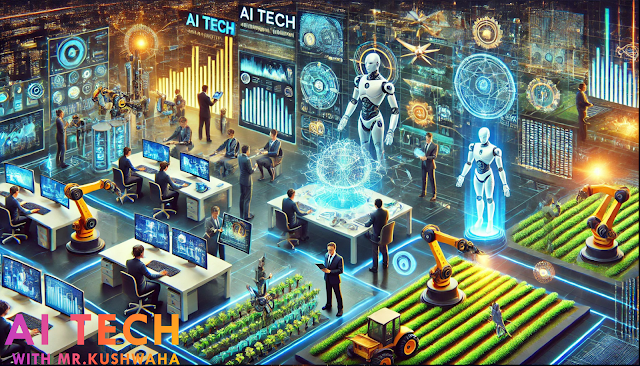Explore how AI is transforming industries like healthcare, finance, retail, and education. Learn top AI tools, real examples, and FAQs.
.png)
How AI Is Used in Other Industries: Tools, Examples & FAQs
Artificial Intelligence (AI) is no longer just a tech buzzword; it’s transforming every sector globally. From automating repetitive tasks to powering complex analytics and decision-making systems, AI is creating massive value. In this blog, we’ll explore how AI is used in various industries, list top tools with website links, real-world examples, and include FAQs, plus a unique image generator prompt to visually support your content.
(toc)
1. Introduction to AI Across Industries
Artificial Intelligence refers to machines' ability to simulate human intelligence. It includes subfields like Machine Learning (ML), Deep Learning, Natural Language Processing (NLP), and Computer Vision. Industries today use AI to automate workflows, analyze data, predict outcomes, personalize services, and much more.
2. AI in Healthcare
Applications:
Diagnosing diseases with medical imaging
Personalized treatment recommendations
Predictive analytics for patient readmission
Chatbots for patient queries
Robotic surgeries
Example: IBM Watson assists in oncology treatments by analyzing medical data to recommend suitable options.
Tools:
3. AI in Finance
Applications:
Fraud detection and prevention
Algorithmic trading
Credit risk scoring
Customer service chatbots
Personalized financial advice
Example: JPMorgan Chase’s COIN tool reviews legal documents using NLP, saving 360,000 hours annually.
Tools:
.png)
4. AI in Education
Applications:
Personalized learning paths
Automating grading systems
AI tutors for student assistance
Sentiment analysis in student feedback
Example: Carnegie Learning uses AI to adapt math lessons based on individual performance.
Tools:
5. AI in Manufacturing
Applications:
Predictive maintenance
Quality control with computer vision
Supply chain optimization
Automation in production lines
Example: Siemens uses AI to predict and prevent system failures.
Tools:
6. AI in Transportation & Logistics
Applications:
Route optimization
Self-driving vehicles
Warehouse automation
Demand forecasting
Example: UPS’s ORION system uses AI to optimize delivery routes, saving millions annually.
Tools:
7. AI in Retail & E-Commerce
Applications:
Product recommendations
Inventory management
Dynamic pricing
Chatbots for customer support
Example: Amazon uses AI-powered recommendation engines that generate 35% of their sales.
Tools:
.png)
8. AI in Agriculture
Applications:
Crop and soil monitoring
Pest and disease prediction
Automated irrigation systems
Harvest prediction
Example: Blue River Technology uses computer vision for precision weeding.
Tools:
9. AI in Entertainment & Media
Applications:
Content recommendation
Automated video editing
Script writing
Audience sentiment analysis
Example: Netflix uses AI to tailor content suggestions based on viewing behavior.
Tools:
10. AI in Cybersecurity
Applications:
Intrusion detection
Threat intelligence
Automated response systems
Behavioral analysis
Example: Darktrace’s AI systems learn normal behavior in a network and alert anomalies in real-time.
Tools:
11. Top AI Tools Used Across Industries
| Tool | Industry | Main Feature | Website Link |
|---|---|---|---|
| IBM Watson | Healthcare | Medical diagnosis & NLP | Link |
| ChatGPT | Education, Content | NLP, content creation | Link |
| Salesforce Einstein | Marketing | Predictive sales & analytics | Link |
| TensorFlow | All | Machine learning framework | Link |
| RapidMiner | Finance, Marketing | Data science platform | Link |
| H2O.ai | Insurance, Finance | Automated ML | Link |
12. Real-World Case Studies
1. BMW (Manufacturing): Uses AI to analyze images during production, catching defects early.
2. Ping An (Finance): AI-driven health checkups using facial recognition and voice analysis.
3. Duolingo (Education): Utilizes AI to recommend exercises and assess pronunciation.
4. Walmart (Retail): AI monitors inventory in real-time and restocks items automatically.
.png)
13. FAQs
Q1. What is the most common use of AI in business? A: Predictive analytics, customer service automation, and recommendation engines are the most common.
Q2. Can AI replace jobs in all industries? A: AI can automate repetitive tasks but is more likely to augment human roles than replace them entirely.
Q3. Is AI cost-effective for small businesses? A: Yes. Many tools offer scalable pricing models and can drastically improve productivity.
Q4. Which industries benefit the most from AI? A: Healthcare, finance, retail, and manufacturing currently benefit the most.
Q5. How can I start implementing AI in my business? A: Begin by identifying repetitive tasks, explore AI tools relevant to your industry, and consider starting with a pilot project.
14. Conclusion
AI is not just a technology for the future—it’s a powerful tool that’s already transforming industries around us. From automating workflows and enhancing productivity to unlocking new insights through data, AI’s potential is vast. Whether you're in healthcare, finance, agriculture, or media, there’s an AI solution that can bring innovation and efficiency.
Start exploring and implementing AI today to future-proof your business!
For more related content, check out our blogs on:
Stay connected with the latest in AI, trading, and digital finance!








.png)
.png)
.png)
